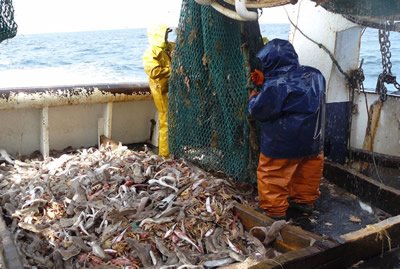UNCTAD is directly supporting the Ocean Conference on trade-related aspects of SDG 14 in a coalition jointly conformed by FAO, UNEP, The Commonwealth, the ACP Group, the International Oceans Institute. It is organising a series of side events and launching several tailor made publications on the occasion of the conference.
The UN Oceans Conference will provide a unique opportunity to bridge consensus gaps in finding a multilateral solution to fish subsidies and secure the implementation of target 6 of Sustainable Development Goal 14, said Mr. Assunção, who heads UNCTAD's Trade, Environment, Climate Change and Sustainable Development Branch.
Global fishing subsidies are estimated to be as high as $35 billion, with at least $20 billion contributing to overfishing and overcapacity, said UNCTAD Legal Officer David Vivas-Eugui highlighting one of the key challenges to be addressed by Member States at the UN Oceans Conference and at the fore coming 11th WTO Ministerial Conference in 2017.
"If you consider that the total export of fish and seafood products is $146 billion, we are talking about that of each $5 in fish products, $1 is subsidized," added Mr. Vivas "This is not a small amount. People are paying very expensively for a fish. They pay it by the dish and with their taxes," continued Mr. Vivas.
This financial motivation creates "a race to the bottom" as fleets compete against each other to harvest increasing amounts of fish - at a time when seafood is already a scarce resource. The subsidies "create incentives to deplete resources faster than if there weren't such subsidies. It is time to take responsibility and effectively manage the global commons", Mr. Vivas added.
According to the FAO, the international community is harvesting fish at unsustainable biological levels. Today, 31 % of all stocks are harvested at unsustainable level. Roughly 51% of all fish products come from wild harvest, with the remaining amount farmed.
"The demand for fish products remains quite strong, mainly from the Asian region. Hence countries are not only going to NY to consider issuing a political signal," said Lucas Assunção in reference to the Ocean Conference in early June, "they are very concerned about the future prospects of this considerable market."
The topic of fishery subsidies is "not new but remains unresolved in WTO negotiations," said Mr. Assunção, who heads UNCTAD's Trade, Environment, Climate Change and Sustainable Development Branch. Concerns over fish subsidies are a suitability issue in its own merits. Links should be avoided with other WTO negotiations.
It involves requesting countries to provide information on what subsidies they provide and prohibiting those that contribute to illegal, unreported and unregulated (IUU) fishing, overfishing and overcapacity, as well as potentially giving differential treatment to developing countries, especially SIDS and LDCs.
UNCTAD is working towards a multilateral fisheries agreement that will be discussed at the Ocean Conference in New York in early June, and at the World Trade Organization's (WTO) Ministerial Conference in Buenos Aires this December.
The idea of such an agreement has support from a number of countries and regional blocs, including the African, Caribbean, and Pacific Group (ACP), the LDC Group, the European Union, a coalition of Latin American countries, New Zealand and Pakistan, whom have produced very specific proposals on how to move forward.
"Not all countries benefit equally," Mr. Assunção said of the nearly $156 billion market for fish and marine products. "[The oceans are] a global common good that is not benefitting on equitable ways all countries that have coasts."
Some governments have said that they will use the Ocean Conference as an opportunity to seek access and connectivity to bigger markets. The issue is of particular concern for Pacific and Caribbean Island States where processing and transporting goods is often more expensive. For example, in 2016 ten of the least connected countries according to UNCTAD's Liner Shipping Connectivity Index (LSCI) are SIDS.
The main areas of work at the Ocean Conference will be a political Call for Action outcome document, a segment on partnership dialogues and a list voluntary commitments.
UNCTAD is directly supporting the conference on trade-related aspects of SDG 14 in a coalition jointly conformed by FAO, UNEP, The Commonwealth, the ACP Group, the International Oceans Institute. It is organising a series of side events and launching several tailor made publications on the occasion of the conference.



